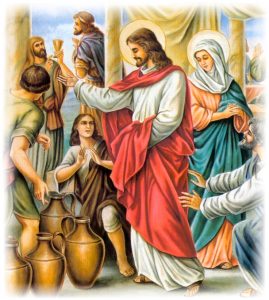HOMILY SUNDAY 02 – YEAR C
Marriage and a New Creation
(Isaiah 62:1-5; Psalm 96; 1 Corinthians 12:4-11; John 2:1-12)
*********************************************************
One year, on December 30th, a wedding took place in the northern Manitoba community of Lac Brochet. A young couple decided it was time for them to make a lifelong commitment before God in the presence of the gathered community. Everything about the wedding, from the rehearsal to decorating the hall, to the ritual itself with its emotional moments, to the wedding banquet and dance, shone in one of the darkest and coldest nights of the year with joy and celebration.
That wedding, as are most weddings, was for all who attended, a moment of closeness to God, to the reign of God here on earth. The joy; the celebration; the dancing, the commitment – all spoke of God’s love and commitment to us.
It is no accident that on this Sunday beginning Ordinary time the Gospel presents us with a wedding, and the first reading speaks of the relationship of God with God’s people as an intimate marital relationship.
This Sunday actually completes the gradual manifestation or revelation of Jesus to the world in stages that first began with angels singing to shepherds near Bethlehem, second to the gentiles in the persons of the magi, then in the Jordan at the baptism of Jesus (last Sunday), and today at a wedding feast.
 We are invited in all of this to commit ourselves in faith to Jesus, to believe in him, and to follow him as his disciples into a new creation.
We are invited in all of this to commit ourselves in faith to Jesus, to believe in him, and to follow him as his disciples into a new creation.
The gospel begins with the words, “On the third day.” This alludes to the third day of Jesus’ public ministry, and at a deeper level, to the third day of a new creation.
Of note is the fact that Mary is not mentioned by name. What we hear is her role as his mother, and as woman. This is also a reference to a new creation. Mary is the new Eve of this new creation that will come about through the life and ministry of her Son, especially through his passion on the cross. That is clear when Jesus calls her woman – as he does on the cross.
In fact, when Jesus seems to resist her entreaty, saying that it is not his hour, he is saying that the real miracle will not be transforming water into wine, but rather, his death on the cross, his hour, leading to his resurrection and the gift of the Spirit on the Church born at Pentecost.
Mary’s request to Jesus, “They have no wine,” is not just evidence of her sensitive caring towards this poor couple. Here she becomes like the prophets of old who lamented that the Chosen People had lost their way. They had drifted from the covenant relationship God wanted to have with them, and replaced it with laws, rules and institutions, with formalistic religion instead of a transformative religion of the heart. That religion of cultic sacrifice had run out of wine, is what John has Mary saying here.
In telling the servants, “Do what he tells you,” Mary becomes like John the Baptist, pointing the way to Jesus. It is Jesus who is the new wine that will transform the old that has gone stale.
So, Jesus gives in and fulfills the request of his mother, transforming six water jugs into the best of wines. That too is symbolic. The number six in Hebrew thought represents weakness, falling short of seven. The meaning here is that the rituals and traditions of the sacrificial temple religion could never offer the new life that Jesus will bring about by his sacrifice of himself. The jars filled to the brim symbolize the overflowing generosity and abundance of new life that Jesus can give to those who believe in him and follow him as his disciples. We are told that the disciples present there believed in him. So must we, with an ever-growing trust and faith.
In the gospel of John, this is the first of seven mystical signs that he presents to gradually reveal who Jesus is to us, and what he is all about, in terms of inaugurating the reign of God here on earth, and inviting us to be part of it through faith and love.
That message is underscored by the words of the prophet Isaiah in the first reading, who struggles to describe the future that awaits Zion and Jerusalem when the Messiah comes. That description is laced through with wedding imagery and the intimacy of a marital relationship with our God, as he proclaims “you shall be called “My delight is in her,” and “Your land married, for the Lord delights in you, and your land shall be married.”
The Eucharist is both a wedding feast for us with our God, and a foretaste of that heavenly banquet that awaits us. We listen to the Word of God, and receive the very Body and Blood of Jesus that was shed for us on the cross – all through the power of the Holy Spirit that transforms these humble gifts that we present.
So, may our celebration today strengthen our faith in Jesus, deepen his power to work in our lives and empower us to follow him as his disciples into a new creation.



